15 Best Happiness Books and Are They Worth Your Time?
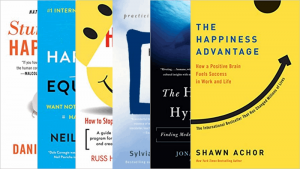 There is a wealth of material out there about happiness.
There is a wealth of material out there about happiness.
Perhaps your ‘taste-buds’ have been tempted by reading about happiness – either on this website, in your practice, or forming research.
You would have found that there are some fantastic books on what is a very broad topic. But it can be hard to decide which to read.
The purpose of this article is to provide a summary of fifteen of the most popular and best happiness books that have been written on this topic. Hopefully, by knowing more about what each of these books are about, and (in some cases) by reading a few short reviews of the books, you can decide which ones may take your fancy.
The books have been written from authors including His Holiness the Dalai Lama, to renowned professors of psychology, and even an economist. They explore topics from a wide variety of perspectives, some you may enjoy learning about. It is hoped that you can use this article as a resource to guide your decision as to which happiness book to read. I hope it is helpful!
Before you continue, we thought you might like to download our three Happiness & Subjective Wellbeing Exercises for free. These detailed, science-based exercises will help you or your clients identify sources of authentic happiness and strategies to boost wellbeing.
This Article Contains:
- The Art of Happiness – the Dalai Lama and Howard C. Cutler
- Authentic Happiness – Martin Seligman
- Stumbling on Happiness – Daniel Gilbert
- The Happiness Trap: Stop Struggling, Start Living – Russ Harris
- The Happiness Advantage – Shawn Achor
- Happiness Is an Inside Job: Practicing for a Joyful Life – Sylvia Boorstein
- The Happiness Project – Gretchen Rubin
- The Happiness Hypothesis – Jonathan Haidt (+ Summary)
- The Happiness Equation -Neil Pasricha
- Happiness – Design: Finding Pleasure and Purpose in Everyday Life by Paul Dolan
- The Happiness Factor: How to Be Happy No Matter What! – Kirk Wilkinson
- The How of Happiness – Sonja Lyubomirsky
- Happiness Beyond Thought: A Practical Guide to Awakening – Gary Weber
- Happiness: Lessons from a New Science – Richard Layard and Baron Layard
- Happiness for Dummies
- A Take-Home Message
- References
1. The Art of Happiness – Dalai Lama
This book was actually written by a psychiatrist, Dr. Cutler, based on interviews conducted over a period of one week with His Holiness the Dalai Lama.
The Dalai Lama, a Nobel Peace Prize winner, is renowned for his personal sense of peace and in this book, readers can learn what they can do to discover this same serenity.
In ‘The Art of Happiness’, Howard C. Cutler puts forward a “western” (i.e. science-based) view of the Dalai Lama’s (a Buddhist monk, also known as Tenzin Gyatso) teachings. It provides an overview of Tibetan Buddhism and the messages from its’ leader the Dalia Lama.
A key feature of the book is the direct quotations from the Dalai Lama. So, what are the Dalai Lama’s teachings about happiness?
Happiness is, according to this book, the purpose of life. Once a person’s basic needs are met, happiness is more the result of the mind rather than events, external conditions, and circumstances.
This book explains that we each hold the key to our own happiness. It argues that, by training our hearts and minds, and by actively working on our attitudes and outlook, we can all achieve happiness.
How does the Dalai Lama suggest we find happiness? Well, he advises readers to pay attention to the things that make us happy and to eliminate the things that make us suffer. Further, by achieving peace of mind in this way, the Dalai Lama says this means we can move away from material goods and to seek contentment and an inner sense of worth.
According to the teachings, all people have the potential to do this. It also presents the idea that compassion is a state of mind whereby a person is not violent, harming, or aggressive. The Dalai Lama says we should show compassion to everybody, and that universal compassion towards the right of other people to be free some suffering is important. He explains that showing empathy can help to generate and foster compassion.
Whilst this book clearly explores spiritual teachings, the Dalai Lama contends that all religions should be accepted and that spirituality is about benefitting oneself through a sense of being calm and feeling happy.
Furthermore, ‘The Art of Happiness’ suggests that happiness can be achieved by ‘systematical training of our hearts and minds’.
Available from Amazon as a hardcover book, audiobook or for Kindle.
2. Authentic Happiness: Using the New Positive Psychology to Realize Your Potential for Lasting Fulfillment – Martin E.P. Seligman
‘Authentic Happiness’ was published in 2004, written by Martin Seligman.
Seligman, a psychologist and best-selling author puts forward the idea that happiness is not due to ‘having the right genes’ or ‘being lucky’.
Rather, according to Seligman, true, enduring happiness (i.e. ‘authentic happiness’) is the result of paying attention to one’s personal strengths rather than focusing on perceived weaknesses.
Seligman, who has been described as the father of positive psychology, applies psychological research that has been developing over a long period of time. He shares what he proposes to be the 24 strengths and virtues that make up our psyche. He then explains how to look into the strengths and virtues that each person has. He calls these ‘signature strengths’.
Seligman’s book suggests that authentic happiness is achieved when an individual is able to use their personal strengths in order to improve every area of their life. Seligman has developed resources, including a series of practical exercises, short tests, and a dynamic website program.
Taking these resources, Seligman – an esteemed author – demonstrates to readers how to become aware of their highest virtues and act in accordance with them in a new way.
This book describes how by using their ‘signature strengths’, a person can create a buffering effect against ill fate and negative emotions. However, as well, using one’s signature strengths enables individuals to also make the world around them a better place.
According to ‘Authentic Happiness’, discovering authentic happiness can lead to new, sustainable joy, meaning, and contentment in aspects of life such as work, relationships, and parenting. This book, described as groundbreaking, heart-lifting and extremely useful, explains that happiness can be learned, or, in other words ‘cultivated’.
Amazon has declared that ‘Authentic Happiness’ is the most powerful work of popular psychology in years. Daniel Goleman (author of Emotional Intelligence) calls ‘Authentic Happiness’ “a practical map for a flourishing life”.
‘Authentic Happiness‘ can be purchased from Amazon.
3. Stumbling on Happiness – Daniel Gilbert
This book, written by Professor Daniel Gilbert, was the winner of the Royal Society of Science Prize in 2007. It has been described as very interesting, and funny.
Gilbert demonstrates that most of us don’t know how to make ourselves happy, and he explains why this is the case. All of us wish to be happy, but how do we do so?
According to Professor Gilbert, people don’t know how to predict what will please our future selves. ‘Stumbling on Happiness’ sees Gilbert explain how our brains predict the future and explore whether the brain is able to imagine what it will enjoy.
Prof. Gilbert draws upon the fields of psychology, neuroscience, economics, and philosophy. Gilbert, who is a pre-eminent psychologist, explores another area in this book – human motivation.
Within ‘Stumbling on Happiness’, the author reveals the so-called secrets of motivation. He explores some interesting questions, including: why people order different meals when eating with others, rather than instead selecting what they want; why shoppers who can’t get refunds are happier; and, why even though couples claim their children are a source of joy, they are less satisfied after having their children.
Professor Daniel Gilbert (born in 1957) is a Professor of Psychology at Harvard University. He has previously won a number of awards for teaching and research.
Get this great read from Amazon.
4. The Happiness Trap: How to Stop Struggling and Start Living: A Guide to ACT – Russ Harris and Steven C. Hayes PhD
Dr. Russ Harris is a medical practitioner with particular expertise in stress management and he trains coaches, psychologists, doctors and other health professionals in the use of mindfulness. This is an easy-to-read self-help book that was published in 2013.
‘The Happiness Trap’, which has been described as empowering and practical, introduces ACT (Acceptance and Commitment Therapy). ACT is a relatively recent approach to psychotherapy that has been developed out of leading research in behavioral psychology.
ACT is centered on a mindfulness-based program designed to decrease stress, conquer fears and find fulfillment. Harris’ book is an international best-seller that has been published in more than 30 countries and in 22 different languages.
In it, Harris explains the myths about happiness and popular ideas about it and suggests that these myths are misleading and inaccurate, and even that in part they cause the widespread experiences of stress, anxiety, and depression. He says that many current psychology programs are, in fact, making things worse.
The title (The Happiness Trap) encapsulates the main argument of the book – that the more people try and achieve happiness, the more they actually suffer in the long-term. Therefore, ACT is suggested as a way to escape ‘The Happiness Trap’. ACT is an innovative new method based on mindfulness.
According to this book, by making one’s values clear and practicing being mindful (in other words, focus on living fully in the present moment), ACT can enable readers to leave the happiness trap behind and discover meaning and satisfaction in their lives.
Mindfulness skills can be learned easily, and are quick ways proven to decrease stress, improve performance, effectively deal with emotions, enhance health, improve vitality and – overall – really improve quality of life!
Harris’ book employs scientifically proven techniques for developing a meaningful, fulfilling life, and can be purchased from Amazon.
5. The Happiness Advantage: How a Positive Brain Fuels Success in Work and Life – Shawn Achor
The author, Shawn Achor, is a lecturer at Harvard University and he co-designed Harvard’s ‘Happiness’ course. He presents over 150 lectures each year on the science of happiness and human potential.
He conducted the largest ever study on happiness and human potential, surveying more than 1600 students.
Based on this study, Achor reveals the 7 core principles of positive psychology that every person can practice to enhance our performance, improve our careers and achieve success at work.
Most people are hoping to be more successful and everyone wants to be happy. Generally, it is believed that, if you work hard, this will lead to being more successful and that becoming more successful will lead to being happy. Achor dispels the myth that we will feel happy if, and when, we become successful.
Positive Psychology suggests that the proposition that we will feel happy if, and when, we become successful is not true. In fact, as Achor explains in ‘The Happiness Advantage’, happiness actually drives performance and success.
When you stop and think about it, this makes sense! I am sure that if we reflect on a time when we felt happy, we will notice that when we are more positive, we are also more engaged, more creative, more able to cope with stress, and more productive.
‘The Happiness Advantage’ is a useful book for those seeking practical advice on the ways to become happier, and also more successful.
To attain that success, visit Amazon for this excellent book.
The happiness advantage (Shawn Achor) book summary
6. Happiness Is an Inside Job: Practicing for a Joyful Life – Sylvia Boorstein
Sylvia Boorstein, Ph.D., is a practicing psychotherapist and co-founding teacher at the Spirit Rock Meditation Center in Woodacre, California.
She frequently presents at psychology conferences and training seminars, and has written bestselling books – including ‘Pay Attention, for Goodness’ Sake’, ‘It’s Easier Than You think’, ‘Don’t Just Do Something, Sit There’, and ‘That’s Funny, You Don’t Look Buddhist’.
Boorstein considered the following questions when starting to write ‘Happiness Is an Inside Job’:
- How is it possible to remain engaged with life day after day?
- How can we keep our minds in a happy mood, and continue loving, when life itself is complicated, challenging and frequently disappointing?
In this inspiring book, Boorstein details advice that offers warmth and wisdom. She explores how, in spite of the odds being against us, that we can still feel a sense of happiness. From her work over three decades, Boorstein has noticed that the ‘secret’ to happiness is to develop and connect with kindness.
She suggests that happiness is found by being kind – not only to our friends, family, and colleagues, but also towards ourselves, others who we don’t know well, and even people we don’t really like!
Boorstein introduces some key lessons from Buddhism – Wise Effort, Wise Mindfulness, and Wise Concentration. She reveals how engaging with these teachings can move us from feeling angry, anxious, or confused and rather find a state of calmness, clarity, and enjoying living in the present moment.
By developing these qualities, according to Boorstein, we are able to deal with all that we encounter with a sense of balance and intelligence. This, according to the author, helps us have a grounded sense of true contentment.
Boorstein shares her knowledge as a psychotherapist, a spiritual teacher, and her role as a grandmother, to deliver a book that has been described as beautiful and comforting. Her engaging stories will draw in the reader’s hearts and minds. The book also features straightforward activities that can be done whilst the book is being read.
The take-home message from ‘Happiness is an Inside Job’ is that, in reality, we all share this journey – life – that, deep down we all seek to console and love one another and, finally, that the best way to live is to live happily.
Available for Kindle or as an affordable hardcover on Amazon.
7. The Happiness Project: Or, Why I Spent a Year Trying to Sing in the Morning, Clean My Closets, Fight Right, Read Aristotle and Generally Have More Fun – Gretchen Rubin
More than one million of Rubin’s book have been sold! This book was written by best-selling author Gretchen Rubin. Rubin has a weekly podcast called “Happier with Gretchen Rubin”.
She has written on a broad range of topics, including biographies of Sir Winston Churchill and John F. Kennedy. Rubin is a graduate of Yale Law School.
‘The Happiness Project’ details Gretchen Rubin’s year-long investigation into what truly leads to a state of contentment. Fellow author, Sonja Lyubomirsky, who is an expert in the topic of happiness, described The Happiness Project as “a cross between the Dalai Lama’s ‘The Art of Happiness’ and Elizabeth Gilbert’s ‘Eat, Pray, Love”.
This book ties in up-to-the-minute science along with classical philosophy and real-world applicability. Rubin’s book has been described as a compelling, completely related tale of transformation.
The structure of this book is interesting. The book is divided into one chapter per month, and each month Rubin chooses to focus on a different topic. Then, in exploring each month’s topic (for example, February: Improve marriage), she sets a few goals to work on – ‘monthly resolutions’.
‘The Happiness Project’ has been described as relatable and funny, and that it provides motivation to focus on, and work on, goals. It shares a very personal and honest story.
Visit Amazon to purchase this very popular book.
8. The Happiness Hypothesis: Finding Modern Truth in Ancient Wisdom – Jonathan Haidt
Jonathan Haidt is a psychology teacher at the University of Virginia. This book is his first for a general audience.
Society relies on so-called truths derived from folk wisdom that has been passed down for generations. This unique book draws from inspiration coming from both science and philosophy.
Psychologist, Haidt, exposes the messages that have arrived as being ‘common sense’ because our grandparents and THEIR grandparents have handed them down…
Think of messages such as “what doesn’t kill you makes you stronger”, “do unto others as you would have done unto you” and “happiness comes from within”.
Whilst we rarely question these truisms, most of us hold onto the idea that we will feel truly happy when we earn more money, or find love, or discover success. ‘The Happiness Hypothesis’ examines traditional wisdom by looking to modern science.
Haidt exposes somewhat provocative ideas such as that virtue in and of itself is not actually rewarding, that extroverts are indeed happier than their introverted counterparts, and that conscious thought is nowhere near as important as we may believe.
‘The Happiness Hypothesis’ has been described as remarkable and original – “ancient wisdom in our time”.
You can purchase ‘The Happiness Hypothesis’ on Amazon.
9. The Happiness Equation: Want Nothing + Do Anything=Have Everything – Neil Pasricha
Susan Cain, the author of QUIET, described this book as “a two-hour ticket to changing your life”. Pasricha is a New York Times best-selling author of a series called ‘Book of Awesome’.
He was awarded an MBA from Harvard, is eminently popular as a TED presenter, and he also founded the Institute for Global Happiness.
‘The Happiness Equation’ reveals the nine secrets of happiness, and shows readers that to ‘have everything’ one should want nothing and do anything! Described as counterintuitive, this book is also somewhat controversial.
In exploring the secrets to happiness, Pasricha turns a common ideal upside down and presents the ideal in a whole new light. The author then gives step-by-step guidelines and even handwritten notes that detail how to put each secret into place in order to find a happier life.
Pasricha demonstrates some apparently contradictory teachings, such as why success isn’t the path to happiness and how to make more money than a Harvard MBA.
Furthermore, he dispels multi-tasking as a myth and describes how we actually find more choice is we eliminate options. The author acknowledges that even successful people have negative thoughts and that it is not wrong to have such thoughts.
This book combines humor with wise, practical advice. It introduces the concept that a ‘Culture of Enough’ will lead to more happiness than a ‘Culture of More’. It emphasizes that the choices/decisions we make every day contribute to our happiness and that we should prioritize our happiness.
‘The Happiness Equation’ argues that external rewards are actually demotivating in the long run, and suggests that happiness can be derived by random acts of kindness, regular walks, and owning and accepting who you are as a person.
For hours of happy reading, purchase this inspiring book on Amazon.
10. Happiness by Design: Finding Pleasure and Purpose in Everyday Life – Paul Dolan
Happiness expert, Daniel Kahneman, described ‘Happiness by Design’, which is a Sunday Times bestseller, as ‘bold and original’. This is Paul Dolan’s debut book.
He is a Professor of Behavioural Science at the London School of Economics. He looks at how to influence behavior in order to improve wellbeing.
This book answers the question of how we can make it easier to be happy. Dolan argues, by applying recent, significant research that wellbeing is a result of what we do rather than how we think.
The title refers to ‘re-designing’ our lives in order to maximize happiness. How? Well, according to Dolan, it is about our decisions. He argues that by making informed, deliberate choices without thinking too hard about maximizing happiness, we can discover a life that is characterized by meaning and pleasure.
Jenni Russell (from the Sunday Times) is quoted as saying that ‘few books change one’s life; in 48 hours this has improved mine.’
This book is available on Amazon as a book or Audio CD.
11. The Happiness Factor: How to Be Happy No Matter What! – Kirk Wilkinson
This book, said to be practical and rooted in the real world, was published in 2008. On p. 33, Wilkinson says: “change the way you look at things…and the things you look at change”.
‘The Happiness Factor’ provides a perspective on how to cope with adversity and overcome it in order to discover true, lasting happiness. It explains that we are not defined by our circumstances or our problems.
Wilkinson suggests that every person has the capacity to overcome the set of issues that they are dealing with and to be happy.
Wilkinson uses the acronym P-E-A-S-E-F-U-L to describe an approach to discovering happiness using an unforgettable group of principles that are applicable universally. This approach ameliorates the deleterious effects of stress and other such barriers to happiness.
Therefore, it is proposed that the key to lifelong happiness is overall wellbeing, satisfaction, and fulfillment.
Purchase this practical book on Amazon.
12. The How of Happiness: A New Approach to Getting the Life You Want – Sonja Lyubomirsky
Lyubomirsky, Ph.D. is a professor of psychology at the University of California, Riverside. A research psychologist, a feature of this book is that it is solidly grounded in scientific research. It is comprehensive but easy-to-follow.
The book provides a guide for us to find happiness in our lives in the short and long term.
‘The How of Happiness’ reveals what happiness is (and isn’t!), and what we can do to approach the happy life we imagine for ourselves. It explains the notion of the ‘Happiness Set Point’ – i.e. the biological determinants that explain 50% of our happiness.
Further, Lyubomirsky explains that 10% of our happiness can be determined by life circumstances/situations SO, actually, 40% of our happiness is within our own ability to change.
Lyubomirsky reveals more than a dozen “happiness strategies” that are mindful, intentional activities to engage in that can result in a happier life – including exercises in behaving and thinking optimistically when imagining the future, a guide of how to savor the pleasures of life in the moment, and an explanation of remaining active in order to be happy.
‘The How of Happiness’ provides an overview of the multiple barriers to happiness, and how to utilize one’s own unique strengths to overcome such obstacles.
The book includes a quiz that helps readers to identify the actions that will be most helpful to them. Almost all of the factual statements include a citation, and the book also incorporates an evaluation designed to be used to check in with in order to determine whether the happiness strategies. It has been said by some readers that the book is slightly repetitive.
The 12 ‘hows’ to being happy are:
- Expressing gratitude
- Cultivating optimism
- Avoiding overthinking and social comparison
- Practicing acts of kindness
- Nurturing social relationships
- Developing strategies for coping
- Forgive
- Increasing flow experiences
- Savoring life’s joys
- Committing to your goals
- Practicing religion and spirituality
- Taking care of your body
According to Lyubomirsky, by following these twelve strategies, we can find happiness. To read more about it, you can get this book from Amazon.
13. Happiness Beyond Thought: A Practical Guide to Awakening – Gary Weber
Weber has lived a full, successful ‘worldly’ life; however, he has also sought to fully understand life and achieve a sense of enlightenment.
Incorporating Zen Buddhist teachings with current brain research, Weber provides a set of yoga practices that are designed for practitioners looking for a path to enlightenment.
The practices (asana, pranayama, chanting, and meditation) are designed to provide readers with a practical path to awakening. They are simple and easy to follow, developed from Weber’s pursuit of knowledge with Ramana Maharshi – his primary teacher.
Weber shares his ongoing pursuit of Zen meditation practice and the things he has learned about bettering one’s life from the laboratory… which is actually his yoga mat!
To access these enlightening practices, visit Amazon.
14. Happiness: Lessons from a New Science – Richard Layard
Richard Layard is a leading economist. He believes that the income of a society does not determine happiness. His research into happiness is drawn from the disciplines of psychology, neuroscience, economics, sociology, and philosophy.
His best-known studies have looked at unemployment and inequality.
‘Happiness: Lessons from a New Science’ is noted to be the key book in ‘happiness studies’. It puts forward Layard’s argument – that, despite people wanting more money that, paradoxically, income does not lead to happiness.
As society has developed, people have not become happier despite the fact that, on average, incomes have more than doubled over the last fifty years.
Scientific research has shown this paradox in Britain, the US, Continental Europe, and Japan. In fact, compared to fifty years ago, the First World has seen increases in depression, crime, and alcoholism. Layard actually published the second edition of this book in 2011 to adequately reflect the developments since the first publication.
‘Happiness: Lessons from a New Science’ explores the reasons that determine how we make decisions. Rather than the pursuit of happiness, many personal decisions are reflected as economics, on the level of society. This book promotes re-considering our reasons for making decisions by refocusing on goals.
Make the right decision and purchase this book from Amazon.
15. Happiness for Dummies – W. Doyle Gentry
This book is promoted as “Your hands-on guide to reducing stress, being happier, and living a more fulfilling life”.
It was written by W. Doyle Gentry, Ph.D., who is a clinical psychologist, a Distinguished Fellow in the American Psychological Association, and he was the founding editor of the Journal of Behavioral Medicine.
‘Happiness for Dummies’ claims to provide the way to live a life that is meaningful, healthy and productive regardless of life circumstances. It incorporates strategies to alter one’s behavior in order to develop good habits and act in accordance with one’s surroundings.
Doyle Gentry’s book also describes how to determine one’s current capacity for happiness, to live one’s desired life, to overcome barriers to happiness, and look into one’s unique strengths and virtues.
It aims to outline the meaning of happiness at each stage of self-actualization and provide readers with an understanding of why cultivating positive emotions can lead to better health and wellbeing.
The author aims to dispel the common misunderstanding in the construal of happiness in terms of modern valued outcomes such as wealth, power and success.
This book also promises to its’ audience that by pursuing what they truly wish to, seizing the day, and finding the ‘silver lining’ in everyday challenges, they can improve their spiritual and emotional life and discover meaningful social relationships, as well as learning to appreciate being alone.
‘Happiness for Dummies’ also provides lists of 10 tips of how to raise a happy child, a discussion of common barriers to happiness, and a guide as to which personal habits help to develop happiness.
‘Happiness for Dummies‘ can be bought from Amazon.
A Take-Home Message
With such a vast array of self-help and psychology books about happiness on the market, it can be a challenge to try and work out which ones to invest time in. Hopefully, this summary of ‘happiness books’ can act as a guide to the content of these books to help you make a (slightly!) more informed decision!
The books have a variety of foci, from spiritual studies to positive psychology, and even economics. I hope you have found this article to be helpful in summarising the main happiness books out there.
I am very interested in your thoughts… have you read any of these books? If so, what did you think? Would you recommend any to someone with a bit of time on their hands? Please comment below!
We hope you enjoyed reading this article. Don’t forget to download our three Happiness Exercises for free.
- Achor, S. (2011). The happiness advantage: The seven principles of positive psychology that fuel success and performance at work. Random House.
- Boorstein, S. (2008). Happiness is an inside job: practicing for a joyful life. Random House Digital, Inc.
- Dolan, P. (2014). Happiness by design: Finding pleasure and purpose in everyday life. Penguin UK.
- Gilbert, D. (2009). Stumbling on happiness. Vintage Canada.
- Haidt, J. (2006). The happiness hypothesis: Finding modern truth in ancient wisdom. Basic Books.
- Harris, R. (2011). The happiness trap. ReadHowYouWant. com.
- Lama, D., & Cutler, H. C. (2003). The art of happiness at work. London: Hodder & Stoughton.
- Layard, R. (2011). Happiness: Lessons from a new science. Penguin UK.
- Lyubomirsky, S. (2008). The how of happiness: A scientific approach to getting the life you want. Penguin.
- Pasricha, N. (2016). The Happiness Equation: Want nothing+ do anything= have everything. Penguin.
- Rubin, G., & Rubin, G. (2009). The happiness project. Harper Collins Publishers.
- Seligman, M. E. (2004). Authentic happiness: Using the new positive psychology to realize your potential for lasting fulfillment. Simon and Schuster.
- Wilkinson, K. (2008). The Happiness Factor: How to Be Happy No Matter What!. BookPros, LLC.
- https://www.librarything.com
Let us know your thoughts
Read other articles by their category
- Body & Brain (49)
- Coaching & Application (57)
- Compassion (26)
- Counseling (51)
- Emotional Intelligence (24)
- Gratitude (18)
- Grief & Bereavement (21)
- Happiness & SWB (40)
- Meaning & Values (26)
- Meditation (20)
- Mindfulness (45)
- Motivation & Goals (45)
- Optimism & Mindset (34)
- Positive CBT (28)
- Positive Communication (20)
- Positive Education (47)
- Positive Emotions (32)
- Positive Leadership (18)
- Positive Parenting (4)
- Positive Psychology (33)
- Positive Workplace (37)
- Productivity (17)
- Relationships (46)
- Resilience & Coping (36)
- Self Awareness (21)
- Self Esteem (38)
- Strengths & Virtues (32)
- Stress & Burnout Prevention (34)
- Theory & Books (46)
- Therapy Exercises (37)
- Types of Therapy (64)
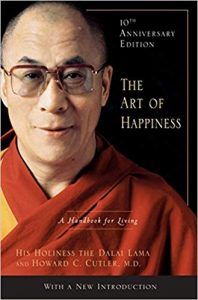
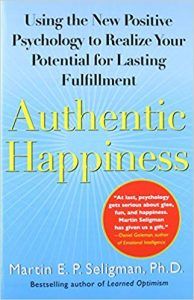

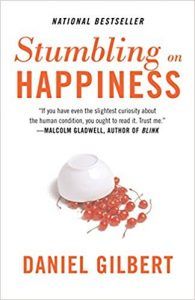
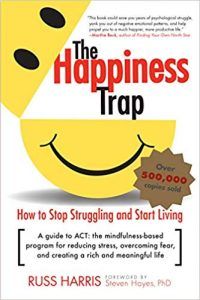
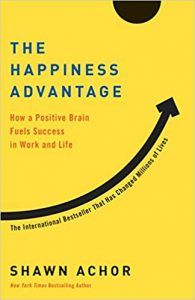
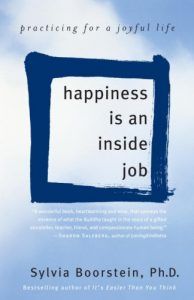
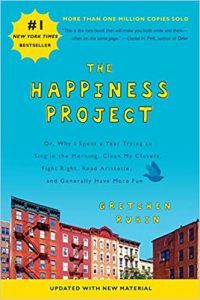
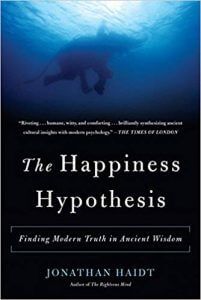
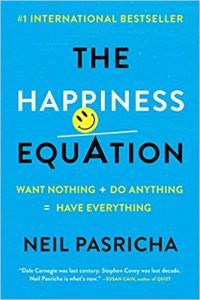
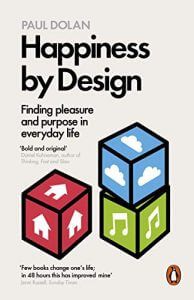
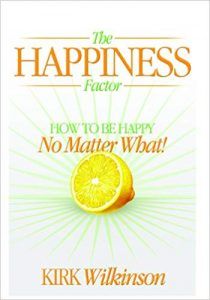
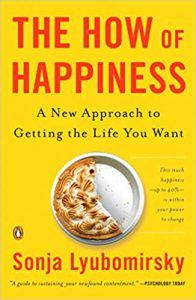
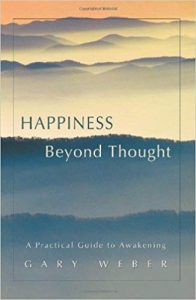
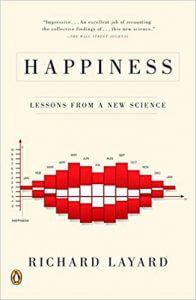
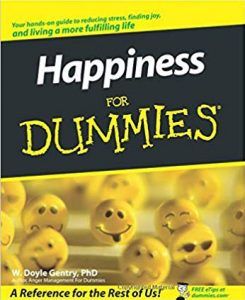




What our readers think
Am happy to see these preambles on the Topic, Happiness.
Which has been in my mind to work on in poetry, text and motivational speech.
And I believe it will impact life positively.
My parents never taught me how to be happy, and today, as a father of a adult son, I realised that how important task for a parent to teach their children the code of happiness. And I have been thinking if my son had only one book he could have from me, which would be the one ultimately for him ?
Thanks for your summary, and until I have the answer, your insight thoughtfulness will always have me inspired.
David
Hey, David. Do you have the answer yet? It’s been 6 months now and I’d find it very interesting.
I am writing a book about happiness so this was super useful to me to understand the various angles others have taken…can’t wait to take the road less traveled!! Tracey Lorraine 🙂
Great Post. I like reading and it’s very useful for me. Thank you for Sharing.
Thank you for the nice and useful list. I also sent it off to my wife and kids to browse through.
I am very curious. From this list, do you have a personal favorite?
Also, there is another you might want to look at.
https://www.amazon.com/Happiness-Serious-Problem-Nature-Repair-ebook/dp/B0014Y09OI
Dennis Prager wrote this one, and I found it to be clear and insightful.